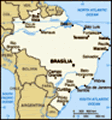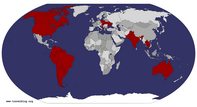Advertisement

 BRA
BRA
Without question, my all time name of an airline...Olinda exists as Recife’s cultural release valve. A retreat from Pernambuco’s intense, run down, and chaotic capital, it possesses all the characteristics of a colonial town, but is a more humid and steamier version of its competition in Minas Gerais. Wherever I go, at any hour, a coat of perspiration covers my head and neck. Bathing is only a temporary reprieve from the stickiness. Lofty coconut palms rise above the town’s orange tiled roofs. The turquoise Atlantic batters nearby beaches, viewable from Olinda’s Praça da Sé in its upper town. Seven miles further south rises Recife’s massive strip of skyline into which Denver’s would fit at least eight times. Apartment high rises and office buildings run the length of the coast until the day’s haze impedes further vision. Only a few thousand yards offshore, the various shades of blue turn an ominous dark where the reefs after which Recife was named rise from the ocean floor. Olinda is a sight in itself, not to be approached with any particular program or itinerary. The treat of this quiet, yet touristy community is to slowly walk through it and stare at the brilliantly colored doorways and window sills of mustard, creamy blue trimmed

 Colorful face
Colorful face
Tropical pace...in high gloss white, and restrained tinges of orange. Churches and monasteries appropriately anchor ends of streets and flower-decked squares. To discuss its individual attractions is not the point. Rather, Olinda is to be enjoyed slowly and in its entirety.
Sadly, Olinda is currently undergoing a certain state of siege. The police have made a highly concerted effort to reduce crime by assigning pairs of armed officers at strategic points throughout both the upper and lower town. Although an unfortunate necessity, Olinda has been by and large cleaned up from crime. Now, visitors like me can walk home safely at night. Coming from Salvador, it is night and day. The only significant irritation follows the fair-skinned sightseer in the form of very aggressive, semi-official guides. The lanyard around their necks and yellow uniform tops veil their clear illegitimacy with anyone who has done five minutes research before arriving. “You want guide, amigo? I can be friend for you. Help in Olinda. Good?” Their approach is relentless and even when rebuked, they return to their colleagues gathered at a park bench unshaken. They uncomfortably laugh at their original target when told to get lost. The laughter masks the constant rejection they

 View of Olinda
View of Olinda
Tourist police always nearby...must endure.
“You know a good place to sleep in Olinda?” I asked the taxi driver at Recife’s airport. Earlier on while awaiting my luggage by the conveyor belt, I inquired as to public transport option from to Olinda. The instructions I received from the taxi dispatcher (OK, I should have asked someone else, I know) involved a complicated connection somewhere I could not pronounce. The dispatcher’s penmanship on a scrap piece of paper provided no further assistance. I booked a taxi after negotiating a lower price.
“What kind of place are you looking for? You are Portuguese, very rich. I can fi-“
“No! Not rich.” Reasonable, clean.” I described from him the happy medium between The Four Seasons and curling up on a park bench for the night. Evening covered Recife as we sped through its very unwelcoming outskirts. No matter what the price, the challenge of two buses and waiting on a boulevard at night for who knows how long could wait for another time. The driver had a collection of international customers whom he set up in the finest hotels in Recife. I had little to do with this genre, as he could see by my

 Olinda to Recife
Olinda to Recife
Imposing skyline...soiled shirt (in which I had slept the night before) and unwashed jeans.
“Ah, yes! Just for you! The Pousada d’Olinda, good place. It has a pool, good price, and…”
“Fine, let’s do it, then. As soon as I heard “pool”, I turned him off. Unfortunately, I neglected to hear the end of this report.
“And many, many Europeans. Some Americans, too! You’ll have much fun!” Great, I thought. Any Brazilians?
I had traveled nine hundred kilometers over a lunar topography (and I mean the roadways) of Bahia overnight along with a non-stop flight from Salvador to Recife. Having slept none and frigid from my seat by the AC ventilator, my only source of comfort and heat was the portly women next to me. She expressed little interest in my using her plump forearm as a pillow. At Salvador’s bus station, a mild stupor overcame me for an hour, the closest I would come to any sleep. City buses depart from the central median by the highway that runs by the station. As I climbed the wobbly ramp and crossed above the increasing south bound traffic, I looked down to my left to see dozens of overcrowded buses collecting and

 911?
911?
Homeless man in need...depositing passengers. Many buses have so little room, squashed and suffocating commuters stick their arms out the window for greater comfort. My seat on the concrete slab of a bench was far away from the platform so as not to get drenched by the morning downpour. The overhead roof did little to prevent the water from seeping in at places. In a city of three million, one for which I did not care, I was alone. Completely alone. No one spoke to me and when I asked questions, answers were curt and sharp. I hugged my daypack and bent over in fatigue. All I wanted was to assume the horizontal position, one of dangerous vulnerability given my current surroundings. I fought to keep reading the destinations painted on the side of each arriving bus. Exhausted, anywhere but a bus depot of choking diesel fumes in Salvador Brazil is where I wanted to be. I kept focused at the task at hand: Just get to the airport.
My ride to the airport included a tour of the unsightly blight of Salvador’s dusty and polluted outskirts. I arrived well in plenty of time to be informed that my flight to Recife was

 Warning!
Warning!
No one was in the water...delayed two hours. The aircraft was having some emotional problems in Brasília and we would have to wait until its therapist gave it the go ahead to come to the coast. After three hours, I finally boarded the aircraft. Curiously though, this non-stop flight dropped out of the air in mid flight, touched down in Aracajú to collect more passengers before we continued on to Recife. I think the pilot’s wife was mad at him for getting home late last time. We could not have been on the ground for fifteen minutes.
The time in Salvador’s International airport (currently receiving international flights from Miami and Lisbon only) gave me time to be grateful I was not on another bus for eleven more hours and learn more about being a passenger at a Brazilian airport. Located well out of the city, airports in Brazil are exclusive islands for those few who can afford to fly. Services cater to the upper middle class. Distant from the inner-city horror many have to travel through to get to the terminal, lounges and observation decks shine. These passengers do not abuse the facilities. Brazilians are obsessive shoppers. A disproportional number of boutiques sell supposedly fine chocolate. Massage parlors, beauty salons, and perfumeries cater to women who dress to be seen. The Brazilian awaiting a boarding call must take out his or her laptop if available, even if it is just to play solitaire. Simultaneously, he or she makes several calls and speaks in an urgent voice, albeit with a spouse about the status of the laundry. The entire departure lounge is ruled by a clientèle infected by self-importance.
Salvador’s airport contains a juvenile court office. I stared at it in absolute confusion. Why here? An airport? Do the little snots get out of hand when asked to put the tray in upright and locked position?
Across from the juvenile court and a few desks away from TAM airlines, is a check-in counter for yet another low-cost carrier to clean up after Varig’s corrupt incompetence. This airline’s executives failed to consult an Anglophone prior to launching its marketing campaign. Businessmen and families lined up their bags between velvet ropes to fly BRA Airlines. That’s right. B-R-A, BRA. Could they have come up with something better than this? Like Bikini Express? I can just see the television commercials and magazine inserts for BRA: “As a businessman, when I need a pick up, I think about BRA for my immediate needs.” “If in a hurry to get to Rio, BRA will offer you the support you need.” I am just getting started. “With my two children and family far away in Curitiba, these pair always…” OK, I’ll stop.
“No, Richard, we’ll get this one.” Geert ripped the bill out of my hand for the several bottles of Antarctica we had shared. Usually, I would offer resistance, as the tab amounted to very little anyway. But this circumstance was as close to witnessing Moses part the Red Sea. That’s right. A Dutchman was about to pay for the entire tab. Paralyzed, I released the paper of illegible running ink from collected condensation on the tabletop. Geert had brought his entire family from Eindhoven. It was a wake up call for the two children. Like so many Dutch, they know no real difficulty in their lives. When they walked in the door two hours earlier, no seats were left in the pub but for my largely unoccupied table. I pulled up chairs and ordered them to join me. Before they were seated, I had beers for all but the eight-year-old.
“You sure? We can split the—“
“No! I will do this” he insisted. “I want to.” At that moment, he looked at his large wife and they concurred. The word is out in the Netherlands. The Dutch have been called out on being, without question, the cheapest SOB’s ever from a developed nation. Their reputation follows them wherever they go. Party of twelve and each had a green tea or coffee? Count on the Dutch to ask for separate checks and pay individually with a huge banknote. Buy a Dutch group a round of drinks and you have ruined their whole evening. Unable to offer thanks for the generosity, it is even more unlikely that they’ll offer a round in return. It gets even worse when they’re on vacation in the Mediterranean.
“Gee, Geert, that is really kind of you.” He paid the minimal tab with a newly founded pride. This called for them to receive one of the famous Connecticut lapel pins I give out to those who exhibit random acts of kindness. As of today, I have given away about thirty-five of them.
“You keep a diary, too!” Sandrine blurted out in delectable French over breakfast. I was taking notes about the prior evening’s events.
“It’s a little more than just that, I think.”
“I like to write, too. It helps me remember my travels. I write about first impressions.” She had my attention.
“Look around at the other tables. Each one. They all have cameras. But photos are ten centimeters by six. They are two-dimensional. If that’s what you carry home with you, it reduces the experience. Words, Sandrine, capture where you were, what you heard, and what you feel. And that moment of time is permanently recorded and able to be retrieved accurately anytime you want.” Her boyfriend looked on. He did not speak and stopped chewing his fruit.
“That’s it!” she cried out. You see, Gérard? I told you!” She smiled back at me glowingly. Now, my popularity with Gérard started to dip.
“Many French write when abroad. I see it often. Especially those who venture further from Europe.” Sandrine noticed her boyfriend’s indifference. They started chatting about their day’s plans.
My sole visit to Recife took me by city bus to Boa Viagem. While a different animal at night, this is where Recifenses come to escape the heat alongside stretches of uninterrupted public beach. Ironically, few people actually enter the sea, for fear of shark attack. Sightings are common. The stern signs of warning register with sunbathers. Some go in, but only ankle deep. There is one area where handfuls dare to frolic. It is a heavily guarded area also protected by a breakwater from which one or two cast rod and reel. On even the narrowest stretch between sand and breaking waves, men set up goals and nets for pickup soccer matches. The raw talent that the average player puts on display would be confounding to an American. Our national team would improve its results dramatically if it could randomly select from any of these informal competitions. Across from the drink stands, beach umbrellas, and physical conditioning equipment emerges Boa Viagem’s residential scene. It is a continuous series of high rises, some more modern than others. Tight security prevents anyone from gaining access. Twenty-four hour guards patrol the grounds and the front entrances of many require visitors to pass through multiple glass doorways before reaching the main lobby. In any direction when looking up, security cameras look right back at you. Luxurious marble patios overlook the beach. A thin teenage girl in designer jeans exits from a steel gate with a poodle in tow. Upon further inspection, the first two floors are protected in netting to dissuade unauthorized access or children from falling
Three blocks away from this opulence, residents subsist in the other Boa Viagem. Instead of making a right turn to the beach, a left propels you into world worse than Haiti. It looks like the backdrop for a “Feed The Children” public telethon.
Advertisement
Tot: 0.233s; Tpl: 0.017s; cc: 22; qc: 109; dbt: 0.1747s; 1; m:domysql w:travelblog (10.17.0.13); sld: 1;
; mem: 1.4mb






























